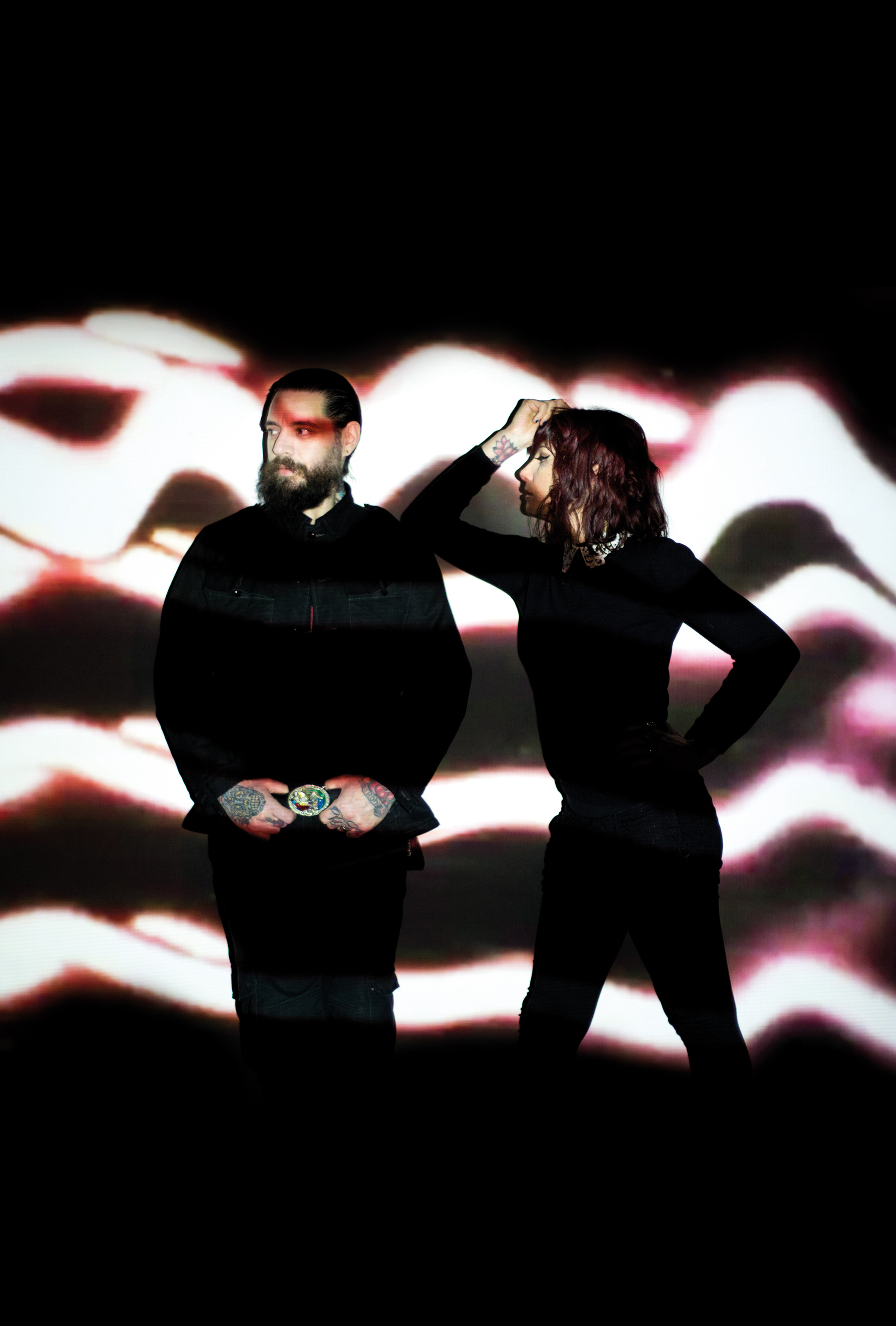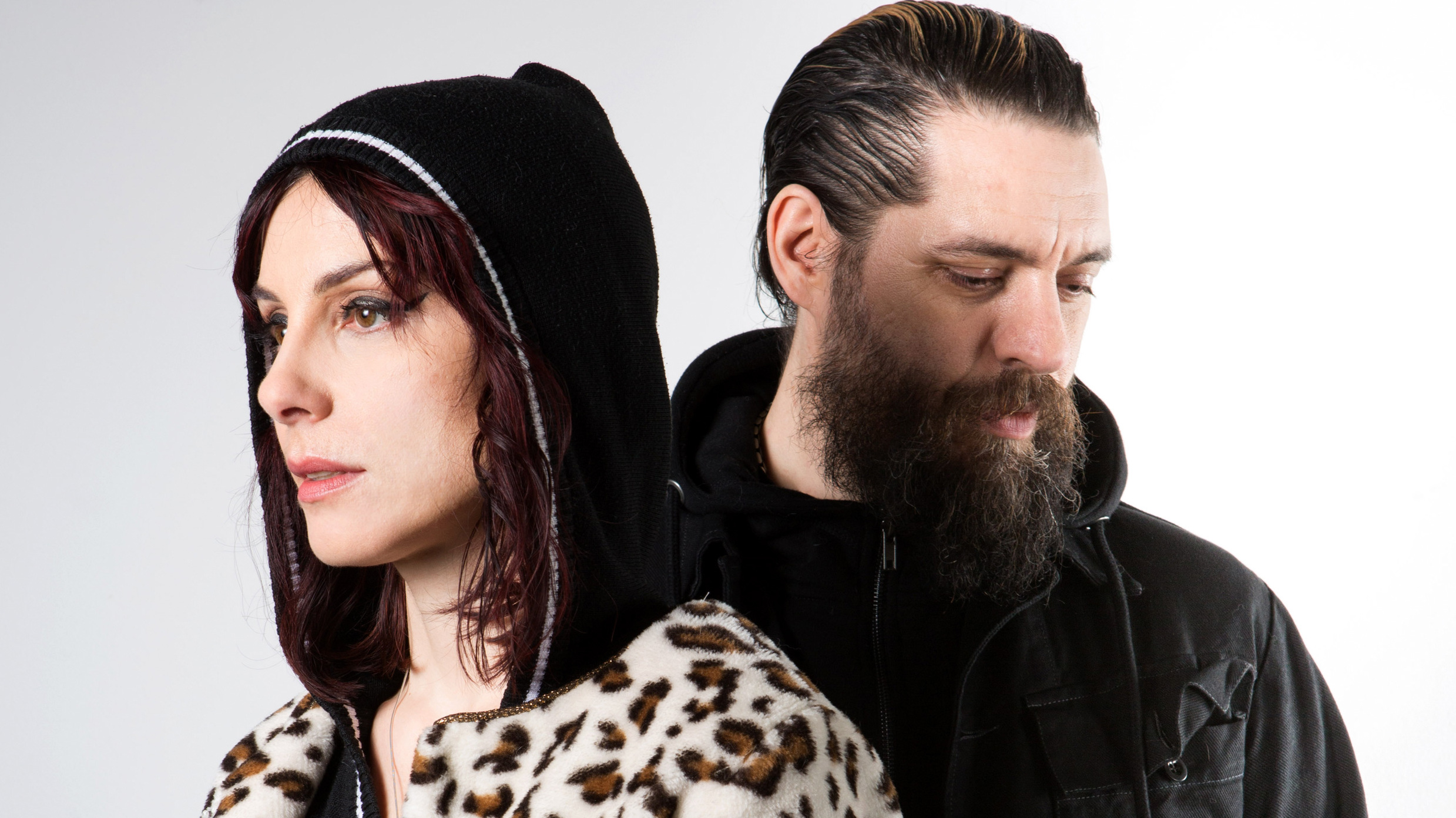ustin Greaves doesn’t follow trends. A perennial square peg in a round hole, he’s meticulously avoided easy categorisation for years, traversing the boundaries of prog, post-rock and experimental rock as the leader of Crippled Black Phoenix. Now with Se Delan, the duo he formed with Swedish singer Belinda Kordic (who is also his girlfriend), his musical parameters remain similarly unpredictable.
“Ten years ago it was, ‘Who’s the heaviest?’ Before that it was maybe, ‘Who’s the fastest?’ Now it’s: ‘Who’s the darkest and spookiest?’” he says via Skype, chuckling good-naturedly through a bushy, jet-black beard. “Lots of new bands are doing that. But we don’t want to just keep going down those roads; easy ones to go down.”
Following their 2014 debut The Fall, Drifter is the second Se Delan album. While the former was recorded in a frenetic four days, the latter has come to life over a longer stretch of time, allowing space for Greaves and Kordic to revisit sections and generally ‘live’ with the whole record for longer. Recording took place down the road from their North Lincolnshire home (at Tripdown Studios, with Ritchie Chappell), and everything was assembled on their own terms. No bandmates to rely on. No massive studio overheads.
The result is an expansive, enigmatic work of alternative rock, ambient yet haunting, drawing at least as much from the cinematic likes of John Carpenter and Ennio Morricone as from other bands. And, of course, it’s resolutely difficult to pigeonhole – just as they like it.
“I always avoid that, to be honest,” Greaves says. “If somebody wants to stick us in with someone, feel free. But it’s really not for me to say. I’d say Se Delan is kind of more accessible than my other stuff, and it’s probably more defined. But that’s a good thing, because CBP is not really defined by any one thing. Se Delan is more stylised; it has a little more definition.”
Where The Fall had a rockier edge, Drifter is an altogether more spacious, electric creation, with analogue electronics and splashes of 70s synths. It makes for an arty, atmospheric yet gothic take on alt rock. Or dark wave. Or whatever camp you place them in. And in terms of the tunes themselves – largely simpler and more succinct than the sprawling, unwieldy works of Crippled Black Phoenix – it’s the closest to ‘pop’ either of them is likely to come any time soon.
“I wanted an album with a beat, something you can move to,” Kordic says. “There’s some good pop music out there. I was almost pushing for more of that with this record. You can do pop in so many ways – a good song is a good song, you know.”
“And the thing is, you could look at, say, Sisters Of Mercy or The Cure or Dead Can Dance and you could call them pop,” Greaves adds. “If we’d made this album in the 80s we’d probably have been in that sort of bracket. It’s the same with Joy Division or New Order. I’m really proud of it though. It’s one of the records I’ve been most proud of.”
Both Greaves and Kordic grew up through mid-era punk rock and 80s goth bands. Subtle, atmospheric echoes of Dead Can Dance and The Cure weave into Drifter, which also features a cover of the song She’s Wild by 80s noise rockers God Bullies, tapping into Greaves’ punkier, noise rock roots.
“That’s what I grew up on in the 80s,” reasons Greaves, “that Amphetamine Reptile [US label], noise rock; psychedelic, weird bands. And because I don’t do that with my other bands, I have got a chance to explore that a bit more here. I hope it’s all subconscious though, and all out of respect to these bands rather than mimicking them!”
For Kordic, it’s the early, jazzier likes of Nina Simone and Billie Holiday that inspire her, as well as male voices such as Benjamin Smoke, Kurt Cobain and Ian Curtis – even the arresting tones of Peter Murphy and post-punk goths Bauhaus – all mixed with an ethereal flavour of old Disney movies. Not that any of these artists are directly referenced, so much as ‘felt’ in the heady layers at work in Drifter.
“I’ve been listening to Bauhaus too, even though you don’t really hear Bauhaus there,” Kordic muses. “It’s all very subconscious. I’m a grunge girl at heart, and everything I like has some sort of darkness to it, so I think that just comes out.”
“A truly dark, heavy tune is in the layers and the feeling behind it,” Greaves says of their natural, uncontrived creative process. “It’s not about how loud you play it, or how tuned down your guitar is. Belinda’s actually got a very dark voice, even though it’s not ‘heavy’ dark.”
Rewind a decade or so, however, and it certainly was. Fronting Swedish grungers STABB in the early/mid-00s, the 22-year-old Kordic dealt almost entirely in guttural black metal vocals. In one sense it’s miles from the waiflike tones she sings in for Se Delan. But in a subtler respect, it summons the same darkened depths – including a proper black metal scream in closer Fear No Ghosts. It makes for an at times unsettling, other‑worldly sound. Does this reflect actual beliefs in other forces, or the supernatural?
“I totally believe in what is beyond,” Kordic says instantly. “It cannot just be what you see, what you smell, hear, touch. I’m quite spiritual.”
Do you believe in God?
“What is God?” she replies thoughtfully. “Blue Bird is kind of about seeing God in everything, but it’s not a bearded man up there. It’s a presence, in birds singing, a child’s voice. I believe there’s something stronger up there, and when we die we’ll find out.”

Thematically, the idea of madness – specifically, a precarious line between sanity and insanity – becomes an unspoken focus. Both Greaves and Kordic have histories of personal demons to (subconsciously) draw from.
“I’ve had the black dog on my shoulders for most of my life,” Greaves concedes. “I’ve suffered quite badly with things like that. It’s a long, boring story. Sometimes I think I should go out and be public about it and help people out, because nobody really talks about things like that. And Belinda’s been through a lot as well. We’ve both lived quite extraordinary lives, I think.”
Born in Australia to Croatian hippie parents, Kordic moved to Sweden as a five-year-old. In her 20s she joined STABB, before channelling her softer side with solo project Killing Mood. Still, in the run-up to Se Delan’s formation, she’d begun to fall out of love with music. Even now, she doesn’t subscribe to the popular notion of writing songs as being in any way therapeutic.
The trick with any music is to write something genuine and heartfelt.
“To be honest, it gives me anxiety because I have to put feelings to paper!” she laughs. “People close to me always complain that I’ll never tell you how I feel. I’ll maybe show it, but I’ll never tell you if I feel shit or depressed. I’m really scared of pulling out things. I could never go to a therapist because I’d have to talk about all these old things. Singing is a release though. Just not the writing part.”
“The best stuff always comes from the dark times,” adds Greaves. “It’s probably a real cliché, but there’s something in it – when times are hard, the strongest art is made.”
For Greaves, conversely, writing for Se Delan has proved a therapeutic contrast to the turbulent times with Crippled Black Phoenix. Following a bitter, very public legal dispute with ex-guitarist Karl Demata over the registered trademark of the band’s name (Greaves called him a “dirty lying dwarf fart” in one interview), the shared creative pressure offered by Se Delan is a relief.
“And with all my other projects I can’t be objective enough because I think about everything,” he says. “With Se Delan there’s that 50 per cent taken by Belinda that I don’t have to think about.”
Not that Crippled Black Phoenix are about to retire – he’s currently in the middle of writing the new album.
“There’s probably the most miserable stuff I’ve ever written there!” he laughs. “But the trick with any music, happy or sad, is to write something genuine and heartfelt.”
Plans are afoot for live Se Delan shows using Ritchie Chappell’s own band. Still, having written various movie soundtracks, for the likes of horror flicks Little Deaths and The Devil’s Business, and more recently for the Future Shock! documentary about 2000AD comics, Greaves concedes that he’d happily opt for a more solitary, film-scoring life.
“That’s really where I’d be happiest,” he agrees. “If I didn’t have to go on tour and deal with record labels and band members and ex-band members, if I was shut away in a studio making music for films, that would be great happiness for me.”
Are you a happy person?
“Erm… I’m happy with certain things,” he nods slowly. “There are things I’m very grateful for, like having Belinda, having my cats [eight in total, but three with Greaves’ folks], having a place in a village with fresh air. But obviously there’s everyday things, there’s all kinds of things…”
He pauses contemplatively for a moment, and then suddenly perks up.
“But I’ve starting riding in the British Gravity Bike Championship too, and that makes me happy. I crashed it last week, so I’m hobbling about on a walking stick at the moment. But doing things like that makes me happy. Or just going for a walk.”
Drifter is out now on Kscope. For more information, visit Se Delan’s Facebook page or see the Kscope micro-site.

